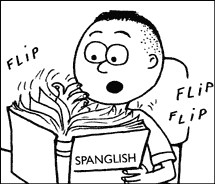 Spanglish
Spanglish
We are well aware that English is one of the most widely spoken languages in the world and that other languages adopt many of our words especially the ones related to media and technology. If you look around yourself in Spain, you will find English everywhere including internet, meeting, fashion, sexy and so on. This phenomena is known as Spanglish, reportedly coined by Puerto Rican linguist Salvador Tio in the late 1940s.
Inglañol
It is also starting to work the other way around. Even the worst possible linguist can’t help but have some element of Spanish infiltrate into their daily English. The term to describe this is less commonly used and is known as inglañol.
Even if you have made no attempt to learn Spanish you won’t be able to avoid absorbing the odd word which is most relevant to your life. If you think about the word urbanisation that we use to describe an inhabited development, you don’t give it a second thought but mention the word to your friends back in the UK and they won’t have a clue what you are going on about.
There are many others which we use the Spanish word for, occasionally adapting it so it rolls off more easily off the English tongue such as Notary. Many of the commonplace words relate to buying houses with Nota Simple and Escritura constantly being thrown into the average British conversation. Or if we can’t pronounce the Spanish we literally translate such as License of First Occupation (Spanish word order).
Daily Life Vocabulary
Once you are living in your own home in Spain you may find yourself needing to install rejas for added security when you are out eating tapas in the local chiringuito. However, this might not be such an issue if you live in an atico. Once you are settled you need to visit the ayunatmiento to make sure that you are registered on the Padron entitling you to empadronamiento. You always have a café con leche or a sombra when you are out and about in the Pueblo. Sometimes you have a cerveza. At the weekend you may drive into the campo after the rastro to eat at a venta where you will be guaranteed a parking. If you are feeling really thrifty, you will probably ask for the Menu del Dia. During the summer you will enjoy the ferias and you love it when there is a Puente and you don’t have to work. You might even be able to enjoy an afternoon siesta.
School Spanish
If you have school aged children you will need to buy materiales at the start of the school year. Your children will no doubt go to school with desayuno in their mochila and they may even stay for comedor and then play for a bit in the patio. If they do after school activities such as deportes, they may need to take a merienda. They go on trips to the granja or the aqua park rather than the farm or the waterpark. Children will also bring lots of words home that may become commonplace in your vocabulary without any conscious effort such as pupa (wound) or bicho (insect). There is something more onomatopoeic about the Spanish versions of these words which makes people want to use them. At the end of term they will receive their notas.
More And More Influence
These words become such commonplace vocabulary that before long we actually start using them with fellow expats and we are no longer speaking just English amongst each other but using lots of Spanish loanwords. Here in Spain we are not the only ones who are integrating Spanish into English, think of the American expression ‘Enough already’ this is a literal translation from ‘Basta ya. The Americans use ‘already’ in the same way as it is used in Spanish possibly due to the presence of the huge Hispanic population.
I am sure that as the expats integrate more and more through their children at Spanish schools or working alongside Spanish people, more and more Spanish will become part of our vocabulary. The strange thing is sometimes the Spanish word just sounds right rather than an English equivalent. So if there is something that cannot be expressed or doesn’t convey the same cultural connotation in English we will opt for the Spanish instead.